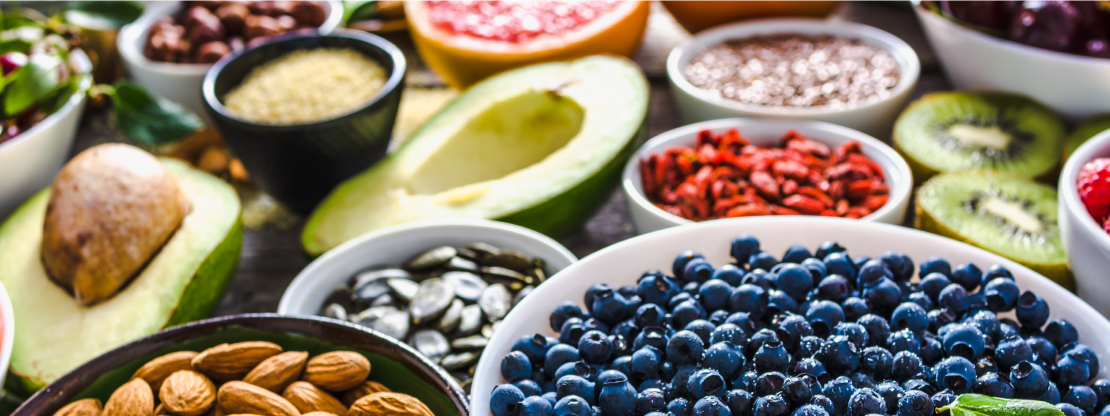March is National Nutrition Month! Test your metabolism and nutrition knowledge with our quiz. Good luck (and no peeking at the answers until you guess)!
- What is metabolism?
A. The chemical reactions that occur throughout the body and that power every aspect of life
B. The biological drive to seek out and consume food
C. A specialized biological system that only processes carbohydrates
D. Transcendence into a “meta” state of being, most often experienced after eating the perfect slice of pizza
A! Metabolism refers to the chemical reactions that take place in the body. Energy and molecules produced by these reactions are distributed throughout the body, powering every facet of life, from digesting a big meal to ensuring your heart continues to beat. Learn more by watching the explainer below:
- What is a calorie?
A. A unit of measurement for how much food a person can eat in a given timeframe
B. A unit of measurement for the energy produced by the breakdown of food or expended through physical activity
C. A unit of measurement for how long it takes to convert 1 gram of carbohydrates into energy
D. A unit of measurement for the amount of energy provided by one glass of apple juice
B! A calorie is a unit of measurement that is used to indicate the amount of energy produced by the breakdown of food or expended through physical activity. In technical terms, one calorie is equal to the amount of energy needed to raise the temperature of one kilogram of water by one degree Celsius. Put another way, there is enough energy stored in 1 pound of body fat to power a 40-watt light bulb for more than six minutes!
- What is energy?
A. The innate desire to go do something
B. The invisible force provided by a strong cup of coffee
C. Something I just don’t have right now, but that the cat seems to have in excess
D. The ability to do work
D! Energy is tough to describe, but most scientists define it as the “ability to do work.” It comes in many forms, such as motion, heat, light, chemical and electrical. Energy is the end-product of metabolism — it allows us to live our lives each day.
(Source: Britannica.com)
- True or false: Metabolism is a standalone system in the body. It doesn’t really affect other systems, such as the immune system.
False! Metabolism is closely connected to every other system in the body. It provides the energy for everything, from keeping our hearts pumping to ensuring the immune system can function.
- Metabolism plays a role in which of the following diseases?
A. Diabetes
B. Parkinson’s
C. Cancer
D. All of the above
D! Metabolic processes have been linked to many diseases. For example, one of the most common metabolic diseases is diabetes, which occurs when the body cannot properly process sugars.
Metabolism also plays a role in cancer. Cancer cells have a voracious appetite that helps them replicate and spread. This adaptation also may be a weakness — scientists are searching for ways to starve cancer cells of energy and, in doing so, treat the disease. Certain types of cancers, such as those in the pancreas, produce special carbohydrates called glycans that one day could be used for earlier and more definitive diagnoses. Think of them like molecular fingerprints that scientists can use to differentiate a sick cell from a healthy cell. Read more here.
Lastly, Parkinson’s disease also might be linked to disruptions in metabolism. Recent evidence has shown that problems with the mitochondria — more commonly known as the metabolic powerhouses of cells — may allow debris such as abnormal proteins to build up, eventually killing cells and leading to the disease’s hallmark symptoms. Read more here.
- During digestion, the body breaks down foods into its most basic components, which include:
A. Protein, fats, carbs, enzymes and plaques
B. Lions, tigers and bears — oh my!
C. Sugars, amino acids, vitamins and minerals
D. Grains, vegetables, meats
C! During digestion, the body breaks down food into its most basic components — sugars, amino acids, vitamins and minerals.
- True or false: Nutrition and metabolism are related.
True! But remember, while food and nutrition are major players in metabolism, they aren’t the only ones. During digestion, the body breaks down food into its most basic components — sugars, amino acids, vitamins and minerals. Some of these nutrients will be used right away to fuel everyday functions, while others will be stored for later use.
- True or false: A person’s diet may influence the health of their children or even future generations down the line.
True! Although we still have a lot to learn, evidence to date suggests that nutrition and the environmental factors to which we are exposed have a ripple effect across generations, possibly even altering a person’s predisposition to disease. Read more here.
- What happens to the energy produced by metabolism?
A. It is used immediately — none of it is stored.
B. Some of it is used and some of it is stored — it depends on the body’s needs at that moment.
C. All of it is stored for later use.
D. It becomes one with the resonant frequency of the universe.
B! Some of it will be used right away to fuel everyday functions, while some will be stored for later use in the form of fat.
- True or false: Better understanding metabolism can help us find new ways to promote health, and to diagnose and treat disease.
True! Rigorously studying metabolism and how it is impacted by nutrition, genetics, epigenetics, environment and other factors is critical for developing metabolism-based therapeutics and interventions with the ultimate goal of improving human health.
Learn more about VAI’s metabolism and nutrition research here.
